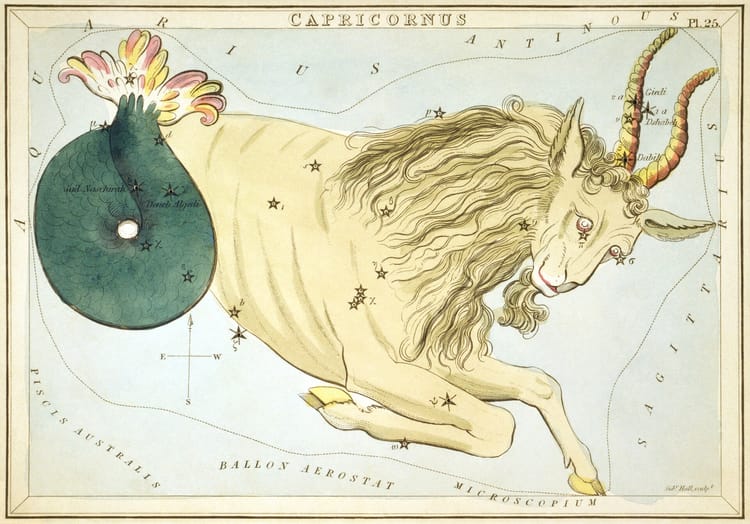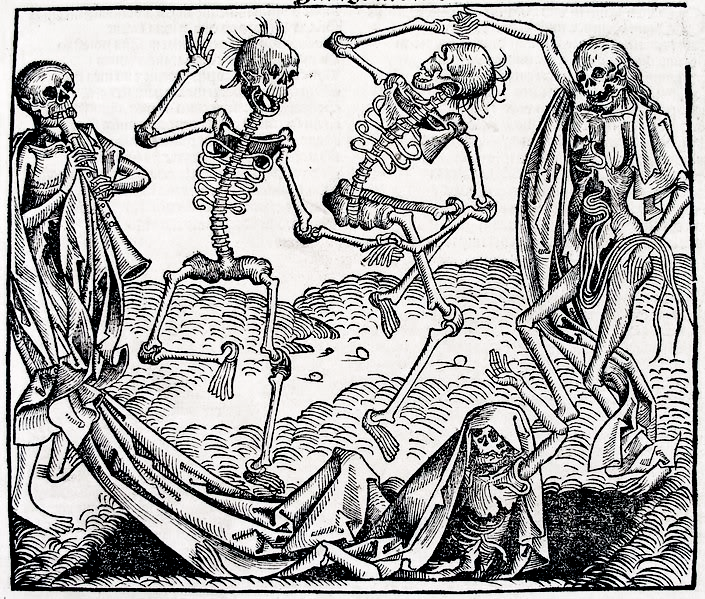Last Quarter: Trauma is a waveform

Hello. It's Friday, with Virgo season setting in. Poke berries are ripening, wild lettuce flower buds are preparing to open, Sirius rises ever higher before dawn, and one winter squash is taking shape in our garden. Daylight is shrinking at a noticeable pace, the shadows always longer. Night is still rife with shrill insects, but cooler. And yesterday I marked three years since the death of my familiar. I found the anniversary more difficult than the one that came last year; when that beloved cat passed, I had resolved my next great caretaking endeavor would be with a child from my body, and now between last August and this one I could have accomplished that goal but instead have met with other grief.
I could write about either of those things here for this Last Quarter: the death of a pet, the deaths of children I never held. But while I've processed much of the latter in this very newsletter and while the former served as some of the raison d'être here — Salt for the Eclipse being after all "meditations on witchcraft, kink, ecstatic mystery, old lifeways, fertile arts, and trauma healing in an apocalyptic era" — I have not yet written very much about the far earlier life traumas I've worked to heal since long before I published anything here. And I've thought that perhaps I should, because it may not be self-evident that...
- Even if I may seem like a "currently traumatized person" and in many ways am, I have also endured and survived other traumatic experiences long ago that may not be obvious because my healing has progressed much, much further.
- For the aspects in which that healing isn't truly complete, I am still frequently engaged in an inner, relatively private self-questioning process around whether I will ever really "get over" those deeper parts of my past.
- Much of the work that I do with those other newsletter keywords — witchcraft, kink, and more — is a core element of the healing process for those older wounds.
So for some clarity and perhaps some meditation on that last point, I am going to tell you today about how I both am and am not healed from one of the most prolonged and totalizing traumatic experiences of my life, which took place in early adulthood. This will not be a catalogue of every event in that saga, because I've already found significant catharsis and because I've told many details of this story in less pseudonymous contexts I would rather compartmentalize. Rather, this is more a story of aftermaths — both my own and what I witness in people who have gone through similar things.
The above notwithstanding, please be warned that the rest of this post addresses intimate partner abuse, manifesting in emotional, sexual, and financial forms, including highly transphobic elements and some threats of physical violence.
What did happen
Much context will go missing here, but I will try to include what feels specifically important to my objective in this post. Here is what happened to me between the ages of nineteen and twenty-one.
Halfway through my sophomore year of university, I became romantically[1] involved with a girl whom I met online. This was typical of the limited relationships I had ever had up until that point, except for the fact that it was with a girl and it was the first time I got involved with anyone after coming out as (at the time) a trans guy. Also, only a month or so after we declared our affections for one another I was able to meet this girl in person because she lived only a few hours from where I was in school. Of course, I say "girl" and "guy" because both of us were very young even though we were mostly capable of adult decisions. I know I fell in love with her very fast because in addition to having many interests in common and getting to know each other in a particular setting that was conducive to intimate bonding, I was a lonely virgin who felt lucky to have found someone who professed attraction to not only all genders but also to me as a transmasculine person. During our first visit, I gladly lost that virginity with her. I also rapidly discovered that she lived in a very unsafe home, and over the course of subsequent communications and visits I decided to offer her safer shelter after the semester concluded for summer.
You may see where this is going, if you've been through anything similar. But there are always unique permutations for everyone. In my case, everything seemed to be going perfectly for those first few months, and although ferrying her away from home through multiple states was a rather harrowing process, it was still a) legal, and b) successful. Once I started living with her day in and day out, however, cracks almost immediately formed. Within a month she started emotionally abusing me about my chosen religion (at the time) of Catholicism, probably because of negative associations with the Catholic side of her family and some understandable historical sentiments from the Jewish side of her family, whom she identified with more strongly. I let this abuse continue to the point of abandoning my faith in surprisingly short order because I thought my altruistic imperative was to help this vulnerable person feel safe at any cost, and I also misguidedly thought that I had found the only person who would love or desire me in my trans body and identity, so — as far too many people do — I allowed my personhood to start getting compromised.
I only explain that mental process for clarity, not to say that it was my fault anything else happened after that. The point is I occupied a prime situation for someone to victimize me, including someone who barely realized what they were doing. And with that first inch that I ceded, she began to take miles and miles. When the new academic year started, she coerced me into moving in with her at an apartment near campus, instead of the arrangement we originally agreed on where she would get her own place and visit me at my dormitory or vice versa. This rapidly created financial entanglement that I wasn't ready for, and because she had a shopping addiction and hoarding behaviors we lived in absolute squalor while I wound up in credit card debt from her that persisted for more than a decade after the relationship actually ended. It might have helped if I had anything more than the most shoestring student's life budget to survive on, or if she didn't quit the job she took after less then a year and refused to find any work afterward.
Meanwhile and most significantly, she also decided my gender was a threat, as was my circle of friends and the activities I did with them. Systematically, she castigated and manipulated me into "re-evaluating" myself as genderqueer when (at the time) I was not ready for that, and she isolated me almost completely from anyone who wasn't her. When she wasn't completely breaking down my self-esteem, she would outright threaten suicide if I didn't do things that she wanted, even cutting herself with a plastic knife in front of me. If I applied any pressure at all to ask anything from her, she would have meltdowns and once even threatened to punch me in the face. She could turn on a dime from a happy, affectionate partner into a tantrum-throwing, age-regressed nightmare. Sometimes she spoke in a way that scared me because she seemed to be having a paranoid psychotic break. Playing partner, parent, and therapist for her all at once while taking the full brunt of her volatility and having no one else to turn to meant that my academic performance subtly suffered, my focus on postgraduate goals suffered even more, my wardrobe and personal care became a shambles, and my sleep fully dysregulated.
Eventually the transphobic qualities of her abuse — the attempts to forcibly feminize and womanize me — became sexual assault as on several occasions she performed or attempted to perform sex acts on me that I found wildly dysphoric and/or painful. Beyond those instances, I later came to recognize that she raped me in the sense that I also performed sex acts on her under conditions where I didn't want to but thought it was better than her doing other things to me and better than her breaking up with me.
Blessedly, after being in that relationship for two and a half years, I did then figure out — sixteen years ago this month — I wasn't in love with her anymore and had probably fallen out of love rather early on and overall something was incredibly wrong with our life together because now I felt suicidal too. I broke up with her soon after this mental discovery, and although we lived together for a few more months, it was with the intention of her becoming more independent so that I no longer felt obliged to support her. What actually happened was instead that she had a suicidal episode severe enough for her to voluntarily enter a residential program at a mental hospital, which I still have complex feelings about because of the total insufficiency of mental healthcare in this country, but it would still have killed me to stay living with her. A few weeks after that development, she became unwilling to continue in that program, and neither I nor my family were willing to take her back in because of the damage she'd already done. She moved back in with her parents.
And that was that. I haven't seen her since the day I dropped off most of her possessions in a motel parking lot. But like so many partner abuse stories, mine was not as simple as media makes these things seem. At the time I was a young man being abused by a young woman, not the other way around. She was also clearly an abuse victim herself and I knew, then as now, she was probably acting the way she usually did because of behaviors that had been modeled to her by others, or that felt like the only way for her to be safe. When I've discussed more particulars of the situation with qualified professionals, it's seemed rather clear she had completely-insufficiently-treated borderline personality disorder as an outgrowth of PTSD.
In any case, lastly, the story did not just end when I left her and she left me. These stories almost never do.
The scar tissue model
It often makes sense to speak of psychological trauma with the language of physical injury, for a few interrelated reasons. Trauma as a word applies to physical injury itself; and as is increasingly known to the point of becoming a cliché "the body keeps the score," harboring stress within physical systems, with physical consequences. And indeed, when our minds experience things that can cause damage, insufficient processing means that our minds are like open wounds: still extremely painful, still drawing excessively on our resources, and prone to dangerous complications. Extending the metaphor, when our minds have sufficiently processed something damaging, scar tissue has formed insofar as our memories and ways of thinking about the world will not perfectly resemble their earlier, pre-injured form, but that part of ourselves can still mostly do the same things it used to do. And ideally the scar is not accompanied by lingering discomfort or disability, but of course some wounds truly heal smoothly and some do not.
I'm as prone as anyone else is to speaking in this way about my own trauma, especially when it comes to the partner abuse I've just described. The language very adequately encompasses some things I initially contended with and now mostly do not contend with.
For quite a few years after my abuse, I experienced all kinds of insecurity and anxiety, sometimes quite profound, over characteristics of my next relationship (my current marriage) and domestic life that either superficially reminded me of my abuse even though it wasn't abusive, or that were not yet reminding me of my abuse but that I was worried could veer in that direction. It wasn't just bad to live in poverty overall, it was bad to live in poverty because that's how I'd lived with her. It wasn't just bad to live in physical chaos, it was bad to live like that because of how I lived with her. I felt extremely stressed by having to be responsible for certain things that realistically I would always have to be responsible for to some degree, whether or not the person with me needed to situationally pick up some slack. I was afraid of having disagreements and confrontations because they might turn the way that I was used to, even though they never did. I dreaded the new shifts happening with my gender, even though literally zero pressure was being applied by someone else at all. I especially feared any incidents that could suggest sexual incompatibility, because bad sex or diminished good sex were essentially reminders of nonconsensual sex; and I even more greatly feared turning into my ex because of having somehow internalized behaviors of hers, thus potentially sabotaging my current relationship. All of these things were the open wound, or at least a portion of it. This is really the tip of a massive iceberg.
Little by little, scar tissue did form. I was able to manage it by several different means. For one thing, as finances ever so gradually improved, as I shed more and more items that my ex had left behind, and as my owner and I moved out of the place I had previously lived with her, I stopped receiving as many constant reminders of my old circumstances. For another thing, while resolving conflicts in the new relationship was a matter of trial and error, I learned to accept positive reinforcement — to consciously recognize all the times that we actually created win-win solutions together and came to real understandings. Similarly I learned how to better stand up for myself when necessary, without feeling obliged to equate the situation to something that it wasn't. I also did a therapeutic inventory of all the things my ex would do and recognized what I clearly didn't absorb and intentionally worked on the things I could have partially absorbed. I also catalogued what was really going on with my gender and all the reasons it had nothing to do with things my ex had said or done to me. Somewhere in all of this, I wrote an entire, literal book about what had happened. And meanwhile, the sex — which had mostly been good but fraught on several vectors — gradually and significantly improved. To some people it might sound insane to refer to my current partner as my owner and have this be a non-abusive scenario, but all I can say is that's the truth. The structural framework of kink saved me.
In all these parts of my life, which was and is a shared life, I do have scars over my personhood. Once upon a time, if my abuse hadn't happened, I would have become a distinct person; but I think that in all these areas I have mostly grown into someone who can still accomplish the same types of things as that other person would have, who can still lead a very fulfilling life in principle. And in fact, I think I can even do some things better than that other person could. The abuse itself was wrong, but I healed productively, not just acceptably. Sometimes an injury causes us to learn a valuable skill. Sometimes a scar is beautiful.
Yet although there has been this linear healing process, the story does not end here either. The scar tissue model only really makes sense, in my opinion, for the way our minds process trauma whose cause we can easily recognize. We see a wound, we sew it shut, we cover it, we wait patiently, and time does the rest. In all the settings I've so far described where my abuse trauma weighed on me and then eventually didn't, I knew very consciously what the problem was. If not immediately, then certainly quickly. What about the less direct ways that the same trauma affected me — the less direct manifestations of enduring pain? And what about the unpleasant challenge of feeling absolutely, completely "over" some component of the abuse for 99% of my waking hours, but continuing to semi-routinely discover psychological triggers that I never would have predicted until they happened?
A waveform model
I don't suggest this as a real psychologist and definitely not as a physicist, and I'm probably not the first person to do so anyway, but I do sometimes feel as if a more comprehensive way to speak about trauma is like an impact wave passing through a fluid. The original impact itself is the most destabilizing and tumultuous part, but the ripples sent outward can continue on and on for a surprisingly long time, likewise traveling astonishing distances. An earthquake on one side of the Pacific Rim can create a tsunami on the other.
For many years after I thought I didn't any more therapeutic help with abuse recovery, I was still talking to my therapist about questions like, "Why does it feel as if the friends I don't actually want to be that close with take up a huge majority of my time and energy? And why does it conversely feel as if the friends I care about the most never have much time for me?" It took me many, many sessions to unpack the reality that although my pre-abuse self already had social difficulties from autism and a childhood history of emotional rejection or isolation, my abuse compounded all of this. Now I had a particularly complex situation on my hands, namely:
- Even though I had rebounded into a healthy romantic relationship, being with my abuser had normalized what some might call emotional vampirism when I was presented with it among my other peers — I couldn't stop someone from monopolizing my attention until it was far too late.
- Key young adult social bonding experiences that I'd begun were forcibly interrupted by my abuser, leaving me with the sense I could only socialize with my partner's participation — a tricky recipe when married to an introvert.
- I didn't know how to demonstrate my non-sexual affection for those people I cared about most, because demonstrativity itself was only a feature of a capital-R relationship — and if I did feel sexual attraction to them, this was particularly guilt-inducing even though my owner and I had long agreed to conduct ourselves with nonmonogamous values and handle this kind of thing in a mature way. Thus, the people who mattered to me likely did not know they mattered to me because I wasn't really able to tell them.
Since making this realization, I've taken many steps to improve my life on this front, and nowadays I would say I'm doing wildly better. I feel very strong, secure attachments with quite a few friends whom I'd like to have that attachment with, and I'm less consumed by people who actually bother me. I've had sex with other people, too. But compared to the abuse recovery that I thought I'd finished by, say, 2015 or 2016 perhaps, I would not say I was truly in a good place with these other developments until after I had already started writing this newsletter.
That's just one example of my abuse trauma as a waveform. I could go on with many others. These are just a few.
Besides all the music I can't listen to because she always played it, there's the way I unconsciously deepened my natural resistance to having my own music or other media choices completely dismissed by others in favor of them serving as the local tastemaker. At some point I recognized why I reacted poorly to people making judgmental character statements about fundamentally harmless preferences in the arts, but it took me much longer to recognize that people smothering me with their own tastes was triggering.
Despite my sincere desire not to discriminate in finding certain body types attractive, and despite the fact that I very much can be allured by some bodies that are not typically considered attractive these days, I sometimes can barely look at people who have a very specific body shape because they make me think too much about my ex's body and what went on between that body and my own. The shape in question is not important for these purposes. I have similar biases against certain faces, haircuts, fashion senses. And to be clear, I don't find these various traits ugly as an aesthetic metric. It also isn't common that I meet someone who ever looks uncannily similar to my ex. But I have some unfair psychological aversions that I don't yet know how to overcome. These things didn't come up in my original post-abuse therapy because they came up so randomly and it usually didn't impact the quality of my own life. Yet now — some of the things I dislike about my appearance are ways in which I have come to look like her — and so I especially don't know what to do.
Regardless of how far I've come in recovery from sexual abuse — being able to take part in many things that I once feared the abuse had ruined for me — even just the other week I found myself triggered during sex by something that could have been perfectly benign if it happened to someone else. It was just a procedural choice that accidentally took me out of what we can call "the swing of things." This is both historically and currently a trigger risk because if I get mentally disconnected from sexual activity and still attempt to go on with it, hoping to recover the mood again, this often doesn't work as I simply dissociate and flash back to what dissociated nonconsensual activity felt like. I have no idea what can ever be done about this, either.
On top of the obvious ways that certain transphobic statements in public discourse remind me exactly of how my ex spoke about the illegitimacy of my gender, there's the way I get uncomfortable if I'm surrounded too long by people making hostile statements about men and masculinity — even if they're venting about their own abuse experiences, or the frustrations of life under patriarchy that I very much have to deal with too. I'm triggered because I had otherwise reasonable discomfort about men weaponized against me. And I find this issue exceptionally unfortunate because I doubt I will ever be able to heal on this front. People who have been harmed by men are always, always, always going to have to good reason to complain about them, and I am always going to have to walk that tightrope between direct sympathy with their situation and tortured memories about something that happened to me long ago.
In all of these cases, the ripples of the past simply flow. Maybe one day some of them will stop. But some of them probably can't.
Ripples through society
A waveform model may also be best for illustrating how trauma is perpetuated generationally, including with my own abuser. Whenever I speak about her, I frequently try to emphasize that she was simultaneously responsible for her actions and not at fault for developing the mindset that led to those actions. She had been routinely physically and emotionally abused by both parents as well as sexually assaulted by her brother. I can't even imagine going through something like that. I'm lucky that I haven't.[2]
The eternal challenge of generational trauma is, of course, to break the cycle. This is largely easier said than done, particularly if the PTSD is complex, with trauma repeatedly created from the same or multiple forces over and over again. Everyone who survives abuse — whether by avoiding death at someone else's hands or by staving off suicidal instincts — is a hero in some way. But this heroism can also fall apart. It's a very rare person who ever acts so heroically that they never mimic their abusers or their ancestors' abusers even once. I may have dodged becoming like my direct abuser, but I've meanwhile inherited hundreds of lifetimes of violently shaped whiteness, Anglo-colonialism, Roman colonialism. I have so much to unlearn; I can acknowledge significant progress but also must accept the humility of never being perfect.
And it's that very lack of perfection which our traumatized society is ill-equipped to manage. Many of the social pathologies that consume us, particularly online but not at all exclusively, are trauma response behaviors borne out either mistaken belief that healing is impossible, or the opposite mistaken belief that healing has happened when it clearly hasn't. We are never going to throw off our chains if we're too hypervigilant for true solidarity and relationality to take hold; nevertheless, previously and continuously harmed people persist with a strategy of protective disconnection, either retreating from vulnerability by default or overinvesting in a perceived savior and then lashing out at the slightest flaw. I have said before that we live in a state of cultural PTSD, and in more extreme, self-perpetuating cases we live in a state of cultural borderline personality.
The ripples go on. They ricochet off of various surfaces, interplay with each other that past a certain point any individual sound wave is even lost in a sea of white noise.
Riding the waves, with rite
My commitment to my practices, to that which I call rite, has often resulted in the most significant trauma healing for me, alongside formal therapy itself. Some of the trauma in question is that which I've inherited or that which scrawled itself on my brain before any partner abuse. But some of it is the abuse itself.
Witchcraft has contributed to my sense of recovering my personal power. It has allowed me to develop a sense of worth, purpose, focus, and even beauty that does not rest on a partner's approval (even though my owner's admiration and support is always rewarding in its own right). Working with divination has given me a constant ongoing route for self-reflection in intuitive language beyond the therapy space. Exploring fertility rites and sex magic have allowed me to cohesively shape an idiosyncratic gender that carries cosmic importance vastly outweighing the opinions of one human whom I no longer speak with. Developing relationships with plants and guide animals has shown me what healthy attachment and relation-making really involve. Having any religion again at all, even if it isn't Catholicism, is a balm after the sterile atheism my abuser sent me back to for a while. Spending time with fellow practitioners — the ones who approach witchery from similar perspectives to my own, at least — also generally keeps me in regular touch with people who are extraordinarily kind, patient, wise, aware of bigger pictures than individual conflicts and retaliations.
And above all, there is the ecstatic ritual realm that is kink. As I said already, it saved me. My ex and I had started in a nominally kinky relationship, but it turned vanilla very fast. My owner and I started relatively vanilla, but with our shared interests and my prior experience in non-sexual kink through lost friends, the dynamic that we came to shape together has comprehensively transformed my sexuality, my eroticism, my entire somatic experience. Through the protocols of D/s power exchange, I have clear ways to communicate what I need and want out of a relationship, and to understand what the other seeks as well. Through sadomasochism, I have reclaimed my bodily autonomy and sensations. Through bondage, I have relearned trust, putting my body in another's hands when I can do nothing to resist.
Even though I haven't healed entirely in all respects, I know I am on the right path forward because of things like this. And for whatever I will never heal, my rites give me a better means to ride the waves, to sense the ripples as they pass. I have endured. I can always endure, whole or not.
Thus the writing of Salt for Eclipse continues.
[1] This is a word I constantly have issues with, but it's the simplest for today.
[2] Although through repeat experiences with loved ones and peers who are incest survivors, I have grown fairly sensitive around some things that evoke those experiences, essentially triggered by proxy. "Emotional incest" has also happened within my own family.
This was good to write, but I can't imagine it would be easy to read, so I very much appreciate if you did make it to the end. Next week's post is probably going to be briefer due to travel plans, but it will constitute at least some kind of (overdue) overview of the pan-Mediterranean esoteric magical tradition and how my own witchcraft reflects it. The following week, building on my recent post about bondage I'm going to offer some thoughts on rope as a handcrafted item — not one that I can fashion myself, but in keeping with the more "kink 101" discussions that can happen here I will review bondage rope types for the less-informed and share my opinions as someone who gets periodically tied up.





Member discussion